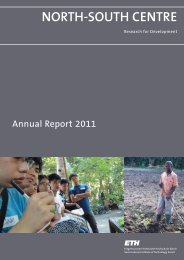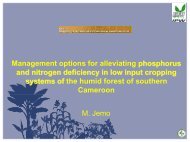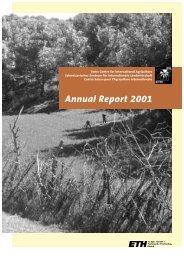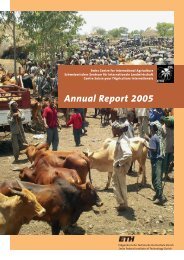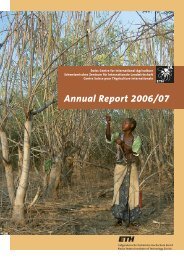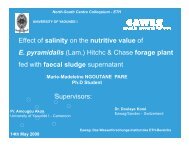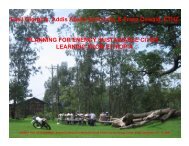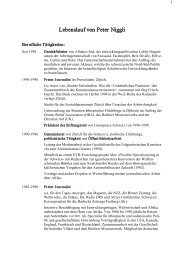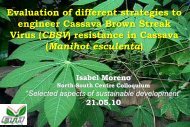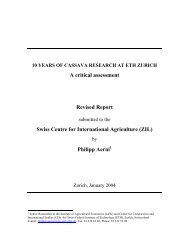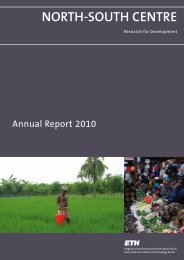NORTH-SOUTH CENTRE - ETH - North-South Centre North-South ...
NORTH-SOUTH CENTRE - ETH - North-South Centre North-South ...
NORTH-SOUTH CENTRE - ETH - North-South Centre North-South ...
You also want an ePaper? Increase the reach of your titles
YUMPU automatically turns print PDFs into web optimized ePapers that Google loves.
An ecosystem service approach to agricultural<br />
security in a sacred landscape mosaic<br />
The value of pollination services for agricultural production<br />
has been much debated, particularly in the context of<br />
alternative management interventions. Our research seeks<br />
to determine the value of pollination services in the context<br />
of a variety of management interventions in a coffee<br />
producing region in <strong>South</strong>ern India. Specifically, we seek to<br />
evaluate the relative benefits that forest fragments afford<br />
to coffee pollination and coffee production under a variety<br />
of management scenarios.<br />
Wild bees are known to provide pollinator services to agricultural<br />
crops such as coffee. By supporting a range of bee<br />
species, forest fragments are presumed to be source habitats<br />
for such pollination services. Hence, it is widely expected<br />
that higher coffee yields will be obtained within<br />
plantations that are located close to forest fragments. To<br />
validate this hypothesis, we quantified bee visitation to<br />
coffee flowers at varying distances from forest fragments,<br />
and under a variety of management interventions for more<br />
than 100 coffee plantations in Kodagu district. Using these<br />
data, we attributed the importance of pollination, of proximity<br />
to forest fragments, and of management interventions<br />
to coffee production.<br />
Bees contribute up to 40% of the total coffee produced in<br />
this region. Yet, the distance to forest fragments did not<br />
affect pollinator diversity or abundance on coffee flowers. A<br />
high density of forest fragments in the landscape combined<br />
with comparatively large foraging ranges of the principle<br />
bee pollinators likely account for this. However, pollinator<br />
abundance at coffee flowers was higher at plantations that<br />
are located near to large forest patches. In addition, several<br />
management interventions contributed substantially to<br />
coffee production. Irrigation by farmers stimulated early<br />
coffee flowering, in turn increasing pollinator abundance<br />
and, as a consequence, coffee production. Addition of lime<br />
and other soil management practices also increased coffee<br />
production. In contrast, retention of native shade trees did<br />
not provide a clear benefit for coffee production.<br />
In conclusion, the benefits of pollination services must be<br />
assessed in the context of plantation management. Technical<br />
interventions greatly increase coffee production. Pollinator<br />
services are secured regardless of local proximity to<br />
forest fragments. At this stage and despite the recognised<br />
value of pollination services, there is little direct incentive<br />
for farmers to retain native shade trees or forest fragments.<br />
36 Project leader<br />
Jaboury Ghazoul<br />
Research collaboration<br />
Livestock systems research<br />
Contact persons<br />
Virginie Boreux<br />
Smitha Krishnan<br />
Collaborators<br />
Jean-Pierre Sorg, <strong>ETH</strong> Zurich, Switzerland;<br />
Uma Shaanker and CG Kushalappa,<br />
UAS Bangalore, India;<br />
Duration<br />
October 2006 – September 2009<br />
Thematic cluster<br />
Livestock and environment<br />
Deity of a sacred forest – Sacred forests are forest<br />
fragments protected by the local community according<br />
to their cultural beliefs.




